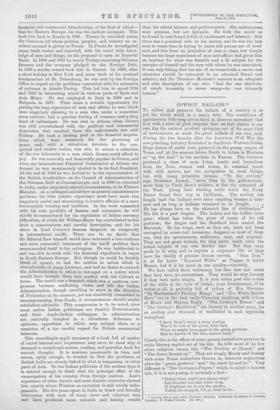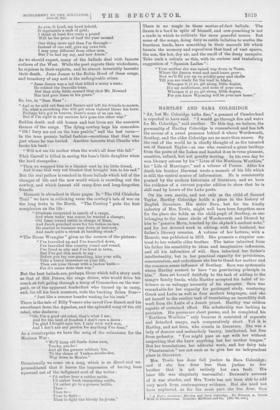COWBOY BALLADS.* To collect and preserve the ballads of a
country is to put the whole world in a man's debt. The conditions of spontaneous folk-song are so hard to discover nowadays that it is with a start of glad. surprise that we find almost in our own day the natural product springing out of the same kind.
of environment as made the great ballads of our own land. During the two decades after the American Civil War the cow-punching industry flourished in the:South-Western States. Huge droves of cattle were pastured on the grassy ranges of Texas, and at the seasons driven North to fatten in Montana or "up the trail" to the markets in Kansas. The business produced a class of men living lonely and. hazardous lives, far from women and towns, in constant touch with wild nature, not too scrupulous in most things, but with many primitive virtues. "To the cowboy," says Professor Lomax, "more than to the gold-seekers, more than to Uncle Sam's soldiers, is due the conquest of the West. Along their winding cattle trails the Forty Niners found their way to California. The cowboy has fought back the Indians ever since ranching became a busi- ness and as long as Indians remained to Ire fought. . .
He has always been on the skirmish line of civilization."
His life is a past chapter. The Indian and the buffalo have gone ; wheat has taken the place of many of his old pastures ; the Angus and the Hereford have ousted the Maverick. So his songs, such as they are, have not been
corrupted by music-hall invasions ; doggerel as most of them are, they are spontaneous, unliterary, racy, and original. They are not great ballads, for they never reach even- the lowest heights of our own Border lays. But they were
made to be sung and to express a corporate life, so they have the vitality of genuine human records. "Sam Bass" is as far below " Kinmont Willie" as Tupper is below Homer, but it is its equal in one quality—sincerity.
We have culled them unliterary, but that does not mean that they have no conventions. They would. be very literary if they were quite simple. It is your urban poet who writes of the wilds in the style of Isaiah ; your frontiersman, if he writes at all, is probably full of echoes of Mrs. Henutus. "By Markentura's Flowery Mange" and "Her White Bosom Bare" are in the best 'early-Victorian tradition, with echoes of Moore and Haynes Bayly. "The Cowboy's Dream" and "The Cowboy's Meditation" are literary in another sense, for no cowboy ever dreamed. or meditated in such ingenious metaphors.
"I know there's many a stray cowboy Who'll be lost at the great, final Sale,
When he might have gone in the green pastures " Had he known of the dim, narrow trail."
Clearly this is the effort of some parson turned cow-puncher to make literary capital out of his life. So with most of the few other religious verses, like "Tile Cowboy at Church" and "The Great Roundup." They are simply Moody and Sankey with some Texas metaphors thrown in; innocent aspirations
after the "green pastures" and" the sweet by and by." Very different is "The Cowman's Prayer," which, to adapt a famous
tale, if it is not poetry, is certainly a fact :
"Prairie tires, won't you please stop P Let thunder roll and water drop. It frightens me to see the smoke; Unless it's stopped, I'll go dead broke.
Cowboy Songs and other Frontier Ballade. Collected by James A. Lomax, London ; T. Fisher Unwin. Ds. net.]
As you, 0 Lord, my herd behold, It represents a sack of gold; I think at least five cents a pound Will be the price of beef the year around.
One thing more and then I'm through— Instead of one calf, give my cows two. I may pray different from other men, But I've had my say, and now Amen."
As we should expect, many of the ballads deal with famous outlaws of the West. While the poet regrets their wickedness, be rejoices in their exploits, and he almost invariably laments their death. Jesse James is the Robin Hood of these songs, and treachery of any sort is the unforgivable crime.
"Jesse James was a lad that killed a many a man; He robbed the Danville train.
But that dirty little eoward that shot Mr. Howard Has laid poor Jesse in his grave."
So, too, in "Sam Bass " : "And so he sold out Barn and Barnes and left his friends to mourn, Oh, what a scorching Jim will get when Gabriel blows his horn. Perhaps he's got to heaven, there's none of us can say, But if I'm right in my surmise he's gone the other way."
Sudden death and old homes and lost loves are the common themes of the songs. The dying cowboy begs his comrades, Oh! bury me not on the lone prairie," and the last verse— in the true prosaic ballad fashion—mentions that that was just where he was buried. Another laments that Charlie who broke his back: "Will not see his mother when the work's all done this fall."
Utah Carroll is killed in saving the boss's little daughter when the herd stampedes : "Then wo wrapped him in a blanket sent by his little friend, And it was that very rod blanket that brought him to his end."
But the real pathos is reached in those ballads which tell of the changes of life and the new world which is crowding out the
cowboy, and which lament old camp-fires and long-forgotten friends.
Humour is abundant in these pages. In "The Old Chisholm Trail" we have in rollicking verse the cowboy's tale of woe on the long treks to the North. "The Cowboy" puts the best complexion on the life : "Abraham emigrated in search of a range, And when water was scarce ho wanted a change ; Old Isaac owned cattle in charge of Esau, And Jacob punched cows for his father-in-law. He started in business way down at bed-rook, And made quite a streak at handling stook."
"The Horse Wrangler" gives us the reverse of the picture : "I've travelled up and I've travelled down, I've travelled this country round and round, I've lived in city and I've lived in town, But I've got this much to say : Before you try cow-punching, kiss your wife, Take a heavy insurance on your life,
Then cut your throat with a barlow knife—
For it's easier done that way."
But the best ballade are, perhaps, those which tell a story such as that of Bill Peters, the stage driver, who would drive his coach at full gallop through a troop of Comanches on the war- path, or of the apparent tenderfoot who turned up in camp, and, for all his book manners, rode the bucking Zebra Dun— "Just like a summer boarder waiting for his hash,"
There is the tale of Billy Venero who saved Cow-Ranch and his sweetheart from the Apaches, and the splendid song of tile old rebel, who declares : "Oh, I'm a good old rebel, that's what I am ; And for the land of freedom I don't care a damn : I'm glad I fought agin her, I only wish we'd won,
And I don't axe any pardon for anything I've done."
As a counterpoise we have the song of the volunteers for the Mexican War : "We'll hang old Santa Anna soon, Yeo-ho, yeo-ho ! And all the greaser soldiers, too, To the chime of Yankoe-doodle-doo, Way down in Mexico."
Occasionally we come on a song which is so direct and un- premeditated that it leaves the impression of having been squeezed out of the indignant soul of the writer : "I'd rather hear a rattler rattle, I'd rather buck stampeding cattle, l'd rather go to a greaser battle, Than— Than to— Than to fight— Than to fight the bloody In-ji-ans." There is no magic in these matter-of-fact ballads. The
Saxon is a bard in spite of himself, and cow-punching is not a trade in which to cultivate tile more graceful muses. But some of the songs, doing duty as cattle lullabies to soothe the fractious herds, have something in their uncouth lilt which haunts the memory and reproduces that land of vast spaces, the sun, the hot, dry air, and the smell of the dusty mesquite. Take such a refrain as this, with its curious and tantalizing suggestion of "Spanish Ladies ":
"Your mother sho was raised way down in Texas,
Where the jimson weed and sand-burrs grow; Now we'll fill you up on prickly-pear and cholla Till you are ready for the trail to Idaho.
Whoopee ti yi yo, git along, little dop,ies, It's my misfortune, and none of your own. Whoopee ti yi yo, git along, little dogies, For you know Wyoming will be your new home."























































 Previous page
Previous page